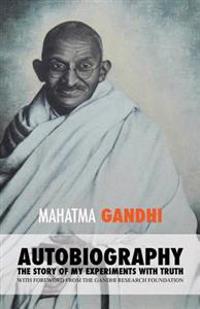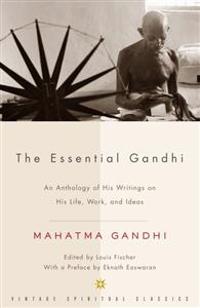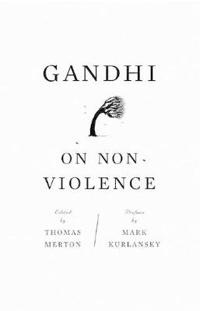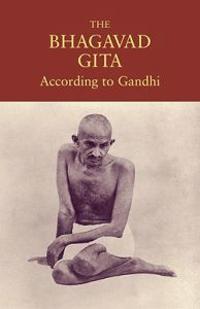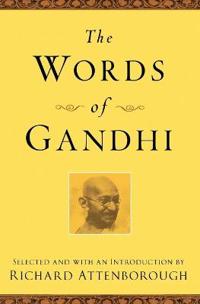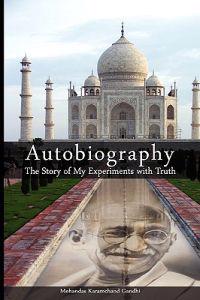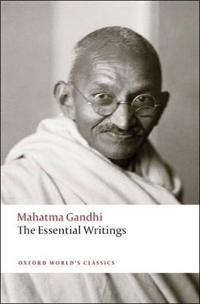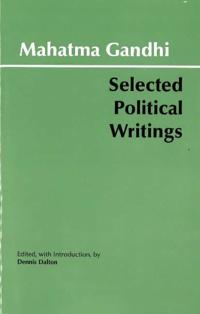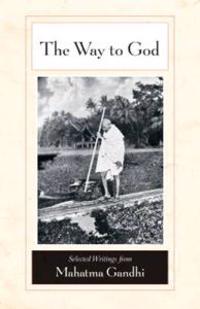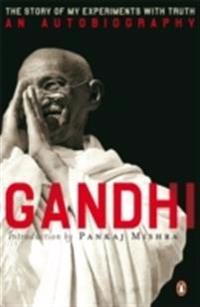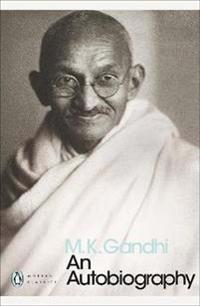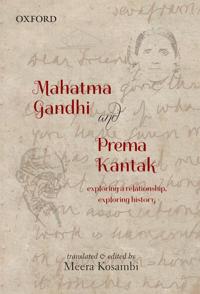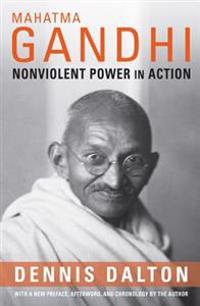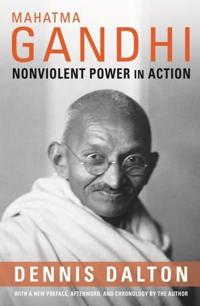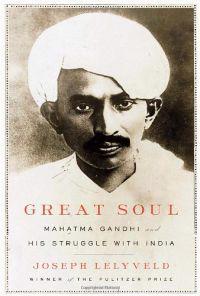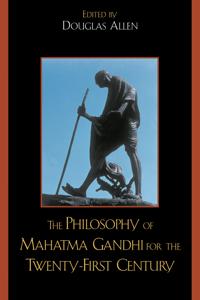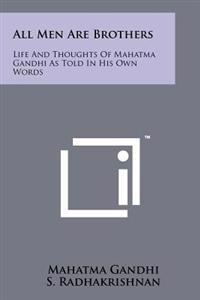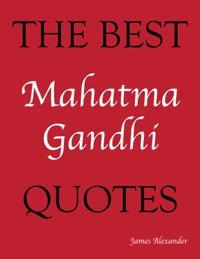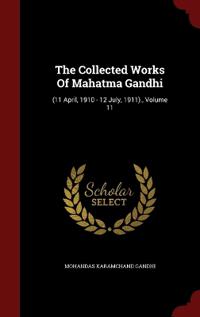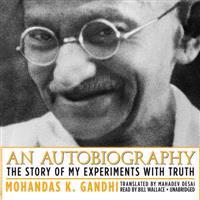Mahatma Gandhi's Autobiography: The Story of My Experiments with Truth (Häftad)
avGandhi Mahatma, Adriano Lucchese
ISBN: 9781500500474 - UTGIVEN: 2014-07The Wit and Wisdom of Gandhi (Pocket)
avGandhi, Mahatma
ISBN: 9780486439921 - UTGIVEN: 2005-05-27Assembled with skill and sensitivity by social activist Homer A. Jack, this selection of brief and incisive quotations range from religion and theology, personal and social ethics, service, and international and political affairs, to the family, education, culture, Indian problems, and Gandhi's most[...]
The Gandhi Reader: A Sourcebook of His Life and Writings (Pocket)
avGandhi, Mahatma, Jack, Homer Alexander
ISBN: 9780802131614 - UTGIVEN: 1994-01-05The Gandhi Reader collects the significant writings by and about Mahatma Gandhi, culled form 500 volumes, newspapers, and magazines. Here is Gandhi in his own words and those of his closest associates, including selections from his autobiography; descriptions of Gandhi by Romain Rollard, Jawaharlal [...]
The Essential Gandhi (Pocket)
avMahatma Gandhi, Louis Fischer, Mahatma Gandhi
ISBN: 9781400030507 - UTGIVEN: 200211Gandhi's most intimate thoughts about life are revealed in these excerpts from his great body of writings, which includes the author's ideas and beliefs on politics, spirituality, poverty, suffering, love, nonviolence, civil disobedience, and his own life. Reprint. 12,500 first printing.[...]
Gandhi on Non-violence (Pocket)
avThomas Merton, Mark Kurlansky, Mahatma Gandhi
ISBN: 9780811216869 - UTGIVEN: 200711The Bhagavad Gita According to Gandhi (Häftad)
avMahatma Gandhi
ISBN: 9781556438004 - UTGIVEN: 200906The Words of Gandhi (Häftad)
avMahatma Gandhi
ISBN: 9781557044686 - UTGIVEN: 200703"The only tyrant I'll accept in this world is the 'still, small voice' within.""Democracy, disciplined and enlightened, is the finest thing in the world." "Strength does not come from physical capacity. It comes from an indomitable will." This 21st-century expanded edition of this inspiring collect[...]
The Story of My Experiments with Truth (Pocket)
avGandhi, Mahatma, Gandhi, Mohandas Karamchand
ISBN: 9789380070209 - UTGIVEN: 2009-07-01It is not my purpose to attempt a real autobiography. I simply want to tell the story of my numerous experiments with truth, and as my life consists of nothing but those experiments, it is true that the story will take the shape of an autobiography.[...]
Autobiography: The Story of My Experiments with Truth (Häftad)
avMohandas Gandhi, Mahatma Gandhi
ISBN: 9789650060343 - UTGIVEN: 200810The Essential Writings (Pocket)
avMahatma Gandhi, Judith M. Brown, Mahatma Gandhi
ISBN: 9780192807205 - UTGIVEN: 200805'those who say that religion has nothing to do with politics do not know what religion means' Mahatma Gandhi was a profound and original thinker as well as one of the most influential figures in the history of the twentieth century. A religious and social reformer, he became a notable leader in the[...]
Selected Political Writings (Inbunden)
avMahatma Gandhi, Dennis Dalton, Mahatma Gandhi
ISBN: 9780872203310 - UTGIVEN: 199611Based on the complete edition of his works, this new volume presents Gandhi's most important political writings arranged around the two central themes of his political teachings: satyagraha (the power of non-violence) and swaraji (freedom). Dennis Dalton's general introduction and headnotes highligh[...]
The Way to God (Pocket)
avMahatma Gandhi, M. S. (EDT) Deshpande, Arun (FRW) Gandhi
ISBN: 9781556437847 - UTGIVEN: 2009-03An Autobiography (Storpocket)
avMahatma Gandhi
ISBN: 9780141032733 - UTGIVEN: 200706Mohandas Karamchand Gandhi was born in Western India in 1869. He was educated in London and later travelled to South Africa, where he experienced racism and took up the rights of Indians, instituting his first campaign of passive resistance. In 1915 he returned to British-controlled India, bringing [...]
An Autobiography (Storpocket)
avMahatma Gandhi
ISBN: 9780141186863 - UTGIVEN: 200109Gandhi's non-violent struggles against racism, violence, and colonialism in South Africa and India had brought him to such a level of notoriety, adulation that when asked to write an autobiography midway through his career, he took it as an opportunity to explain himself. He feared the enthusiasm fo[...]
Mahatma Gandhi and Prema Kantak (Inbunden)
avMeera Kosambi
ISBN: 9780198082934 - UTGIVEN: 2013-07An important feminist thinker, writer, and activist, Prema Kantak's contributions to Indian feminist thought and the nationalist movement have been largely neglected in scholarly studies. Kantak, a one-time resident of Gandhi's ashram, forged a special, life-long bond with the Mahatma, and was hugel[...]
Mahatma Gandhi (Häftad)
avDennis Dalton
ISBN: 9780231122375 - UTGIVEN: 200101Featuring a new preface by the author, this book moves from the birth of Gandhi's method of nonviolent resistance in South Africa to an in-depth analysis of two of his signal triumphs: the civil disobedience movement of 1930 and his historic Calcutta fast of 1947. By focusing on these critical years[...]
Mahatma Gandhi: Nonviolent Power in Action (Övrig)
avDennis Dalton
ISBN: 9780231159586 - UTGIVEN: 2012-03-02Dennis Dalton's classic account of Gandhi's political and intellectual development focuses on the leader's two signal triumphs: the civil disobedience movement (or salt satyagraha) of 1930 and the Calcutta fast of 1947. Dalton clearly demonstrates how Gandhi's lifelong career in national politics g[...]
Mahatma Gandhi (Häftad)
avDennis Dalton
ISBN: 9780231159593 - UTGIVEN: 201203Dennis Dalton's classic account of Gandhi's political and intellectual development focuses on the leader's two signal triumphs: the civil disobedience movement (or salt satyagraha) of 1930 and the Calcutta fast of 1947. Dalton clearly demonstrates how Gandhi's lifelong career in national politics g[...]
Great Soul: Mahatma Gandhi and His Struggle with India (Inbunden)
avJoseph Lelyveld
ISBN: 9780307269584 - UTGIVEN: 2011-03M. K. Gandhi, Attorney at Law: The Man Before the Mahatma (Inbunden)
avCharles R. Disalvo
ISBN: 9780520280151 - UTGIVEN: 2013-10-25The Philosophy of Mahatma Gandhi for the Twenty-First Century
ISBN: 9780739122242 - UTGIVEN: 2008-03This volume shows how Gandhi's thought and action-oriented approach are significant, relevant, and urgently needed for addressing major contemporary problems and concerns, including issues of violence and nonviolence, war and peace, religious conflict and dialogue, terrorism, ethics, civil disobedie[...]
All Men Are Brothers: Life and Thoughts of Mahatma Gandhi as Told in His Own Words (häftad)
ISBN: 9781258111212 - UTGIVEN: 2011-10Best Mahatma Gandhi Quotes
ISBN: 9781291859256 - UTGIVEN: 2014-05Mohandas Karamchand Gandhi, otherwise known as Mahatma ('venerable' or 'great soul') was born on 2 October 1869 in Porbandar, in Gujarat, western India. He became an influential political and spiritual leader renowned for his non-violent civil rights crusade and leadership of the Indian independenc[...]
An Autobiography: The Story of My Experiments with Truth (CD-bok)
avMohandas K. (Mahatma) Gandhi
ISBN: 9781441749918 - UTGIVEN: 2012-05

